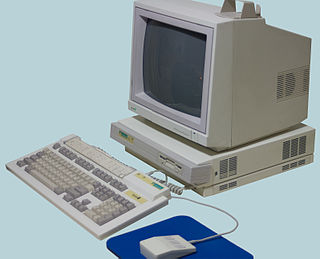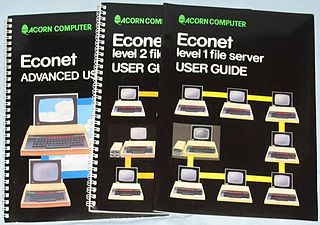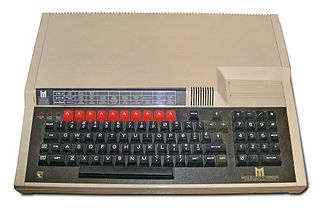Related Research Articles

The history of the graphical user interface, understood as the use of graphic icons and a pointing device to control a computer, covers a five-decade span of incremental refinements, built on some constant core principles. Several vendors have created their own windowing systems based on independent code, but with basic elements in common that define the WIMP "window, icon, menu and pointing device" paradigm.

Acorn Computers Ltd. was a British computer company established in Cambridge, England, in 1978. The company produced a number of computers which were especially popular in the UK, including the Acorn Electron and the Acorn Archimedes. Acorn's BBC Micro computer dominated the UK educational computer market during the 1980s.
ARM is a family of reduced instruction set computer (RISC) instruction set architectures for computer processors, configured for various environments. Arm Ltd. develops the architectures and licenses them to other companies, who design their own products that implement one or more of those architectures, including system on a chip (SoC) and system on module (SOM) designs, that incorporate different components such as memory, interfaces, and radios. It also designs cores that implement these instruction set architectures and licenses these designs to many companies that incorporate those core designs into their own products.

The Risc PC is Acorn Computers's RISC OS/Acorn RISC Machine computer, launched on 15 April 1994, which superseded the Acorn Archimedes. The Acorn PC card and software allows PC compatible software to be run.

Acorn Archimedes is a family of personal computers designed by Acorn Computers of Cambridge, England. The systems are based on Acorn's own ARM architecture processors and the proprietary operating systems Arthur and RISC OS. The first models were introduced in 1987, and systems in the Archimedes family were sold until the mid-1990s.

RISC OS is a computer operating system originally designed by Acorn Computers Ltd in Cambridge, England. First released in 1987, it was designed to run on the ARM chipset, which Acorn had designed concurrently for use in its new line of Archimedes personal computers. RISC OS takes its name from the reduced instruction set computer (RISC) architecture it supports.

The Iyonix PC was an Acorn-clone personal computer sold by Castle Technology and Iyonix Ltd between 2002 and 2008. According to news site Slashdot, it was the first personal computer to use Intel's XScale processor. It ran RISC OS 5.

RISC iX is a discontinued Unix operating system designed to run on a series of workstations based on the Acorn Archimedes microcomputer. Heavily based on 4.3BSD, it was initially completed in 1988, a year after Arthur but before RISC OS. It was introduced in the ARM2-based R140 workstation in 1989, followed up by the ARM3-based R200-series workstations in 1990.

Econet was Acorn Computers's low-cost local area network system, intended for use by schools and small businesses. It was widely used in those areas, and was supported by a large number of different computer and server systems produced both by Acorn and by other companies.
Xara is an international software company founded in 1981, with an HQ in Berlin and development office in Hemel Hempstead, UK. It has developed software for a variety of computer platforms, in chronological order: the Acorn Atom, BBC Micro, Z88, Atari ST, Acorn Archimedes, Microsoft Windows, Linux, and more recently web browser-based services.

The BBC Master is a home computer released by Acorn Computers in early 1986. It was designed and built for the British Broadcasting Corporation (BBC) and was the successor to the BBC Micro Model B. The Master 128 remained in production until 1993.

The A7000 and A7000+ were Acorn Computers' entry level computers based somewhat on the Risc PC architecture.
In computing, the icon bar is the name of the dock in Acorn's RISC OS operating system, and is fundamental to the OS. Its introduction in 1987 was a new concept in GUIs. It displays icons through which access is provided to all parts of the computer that a typical user will require, from physical devices and system utilities to running applications, and will usually be their starting point for interacting with the system once it has finished booting.
Protext is a British word processing program, developed by Arnor Ltd, of Peterborough in the decade following 1985. Originally written for the Amstrad CPC464, it was later sold for the Amstrad PCW series of word processors, for MS-DOS based PCs, the Atari ST, and the Commodore Amiga.
The Advanced Disc Filing System (ADFS) is a computing file system unique to the Acorn computer range and RISC OS-based successors. Initially based on the rare Acorn Winchester Filing System, it was renamed to the Advanced Disc Filing System when support for floppy discs was added and on later 32-bit systems a variant of a PC-style floppy controller.
RISCOS Ltd. was a limited company engaged in computer software and IT consulting. It licensed the rights to continue the development of RISC OS 4 and to distribute it for desktop machines from Element 14 and subsequently Pace Micro Technology. Company founders include developers who formerly worked within Acorn's dealership network. It was established as a nonprofit company. On or before 4 March 2013 3QD Developments acquired RISCOS Ltd's flavour of RISC OS. RISCOS Ltd was dissolved on 14 May 2013.
RISC OS, the computer operating system developed by Acorn Computers for their ARM-based Acorn Archimedes range, was originally released in 1987 as Arthur 0.20, and soon followed by Arthur 0.30, and Arthur 1.20. The next version, Arthur 2, became RISC OS 2 and was completed and made available in April 1989. RISC OS 3 was released with the very earliest version of the A5000 in 1991 and contained a series of new features. By 1996 RISC OS had been shipped on over 500,000 systems.

In computing, Aemulor is an emulator of the earlier 26-bit addressing-mode ARM microprocessors. It runs on ARM processors under 32-bit addressing-mode versions of RISC OS. It was written by Adrian Lees and released in 2003. An enhanced version is available under the name Aemulor Pro.
The VIDC1 was a Video Display Controller chip created as an accompanying chip to the ARM CPU used in Acorn Archimedes computer systems. Its successor, the VIDC20, was later used in RiscPCs.
Impression is a desktop publishing application for RISC OS systems. It was developed by Computer Concepts and initially made available in pre-release form during 1989, having been demonstrated in February 1989 at the Which? Computer Show and subsequently announced as being available from June 1989. The "completed" version was eventually delivered on 18th January 1990.
References
- 1 2 Murphy, Dean (22 August 1994). "MakeModes Manual". RISC World . Retrieved 9 July 2012.
- ↑ Murphy, Dean (30 August 1994). "Makemodes available from Acorn ftp site". Press release. Acorn Computers . Retrieved 9 July 2012.
- ↑ Burrows, Simon (October 1994). "Acorn News" (PDF). Eureka . No. 13. p. 62. Retrieved 9 July 2012.
- ↑ Konietzko, Jochen (February 1995). "Risc PC Screen Modes Made Easy". Archive . Vol. 8, no. 5. Retrieved 9 July 2012.
- ↑ Watkinson, Frank (8 June 2003). "MakeModes Updated Manual". RISC World . Retrieved 9 July 2012.
- ↑ Watkinson, Frank (8 June 2003). "MakeModes Application Note". RISC World . Retrieved 9 July 2012.
- 1 2 "MakeModes – Revised Documents". Acorn News Service . No. 135. 29 June 2003. Retrieved 9 July 2012.
- ↑ "PCPro 3 1998 User Guide". Aleph One. October 1998. Retrieved 9 July 2012.